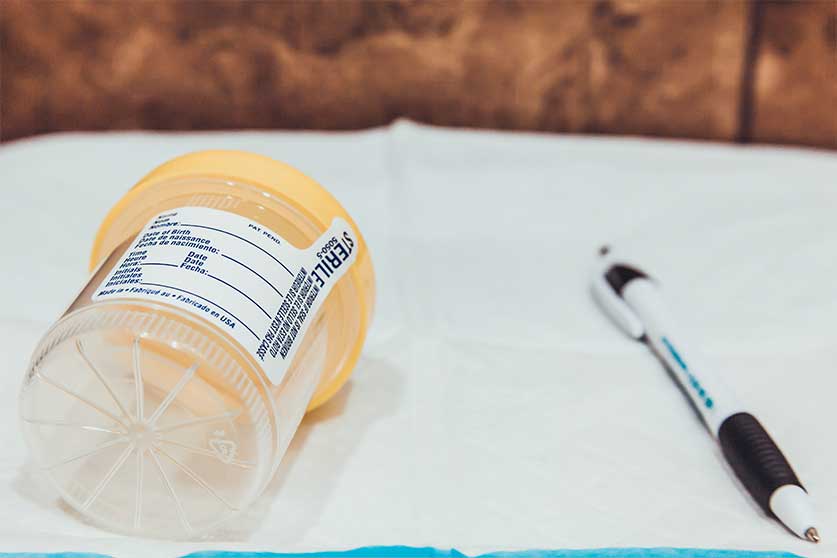How Long Does Fentanyl Stay In Your System?

Medically Reviewed By: Manish Mishra, MBBS

On average, and depending on the type of drug test, fentanyl can be detected in your system for up to 4 days after last use.
The synthetic opioid drug fentanyl (Duragesic, Actiq, and others) is used medically to provide severe pain relief, including breakthrough and chronic pain relief.
However, the drug is also misused, and illicitly produced fentanyl is smuggled into the country in increasing volume, contributing to a rapid rise in opioid overdoses and overdose deaths in recent years.
Fentanyl Drug Tests & Detection Times
There are four types of drug testing commonly used in the United States. These may identify the use of fentanyl for varying lengths of time through the presence of the drug or its metabolites.
How Long Does Fentanyl Stay In Urine?
Urine testing can detect the presence of fentanyl for between 24 and 72 hours after your last use of the drug. However, norfentanyl, a metabolite created in the body as the drug is broken down, can be detected for up to 96 hours in urine.
How Long Does Fentanyl Stay In Blood?
Blood tests can detect the use of fentanyl for between 5 and 48 hours after use.
How Long Does Fentanyl Stay In Saliva?
Neither Fentanyl nor its metabolites are detectable using saliva tests.
How Long Does Fentanyl Stay In Hair?
Hair tests can detect a pattern of fentanyl use for around 90 days, but cannot necessarily detect the drug if use only began in the past 3-5 days or if your fentanyl use occurred very infrequently at low doses.
Factors That Influence Fentanyl Detection Windows
A variety of different factors can change how long fentanyl stays in your body and the amount of time drug tests may pick it up.
These factors include:
- how large your last dose was
- how frequently you have been using the drug
- your method of administration
- whether you used fentanyl alone or with other substances
- your metabolism and liver function
- your tolerance towards fentanyl
- your physical size and body fat composition
- ethnicity
- gender
- age
- hydration and physical activity
Fentanyl Half-Life
The elimination half-life of fentanyl in the body is 2-4 hours, though this can vary significantly depending on how the drug is administered.
Fentanyl Onset & Length Of Effect
Fentanyl is a fast-acting opioid painkiller, taking effect within minutes in most forms, though fentanyl patches may take up to one day to kick in.
When taken in different forms, including lozenges, nasal sprays, injection, and transdermal patches, fentanyl can have a longer or shorter duration of effect at up to 30 minutes, 60 minutes, 60 minutes, and 72 hours, respectively.
Fentanyl Precautions
The FDA has published a variety of warnings and precautions for all medical products containing fentanyl. These warnings include a black box label discussing the risk of fentanyl overdose and respiratory depression, medication errors, and the high potential for fentanyl abuse.
More specifically, the FDA urges that fentanyl should not be prescribed to or used by those who:
- are not already tolerant to opioids
- are children
- have taken a monoamine oxidase inhibitor in the past fourteen days
- are pregnant or may become pregnant
Fentanyl Side Effects
Fentanyl can cause side effects including drowsiness, confusion, and dizziness that may make it unsafe to drive or operate machinery.
Other side effects include nausea, severe constipation, urinary retention, stomach pain, unusual thinking, unusual dreams, difficulty sleeping, dry mouth, heartburn, changes in vision, weight loss, and others.
Fentanyl Overdose
A fentanyl overdose occurs when a person’s dose of the drug is too large or too strong for their body. The effects of fentanyl during an overdose can suppress a person’s breathing, leading to brain damage or death without prompt medical care.
Signs and symptoms of a fentanyl overdose can include:
- unusual drowsiness or sleepiness
- dizziness
- confusion
- gasping, gurgling, or difficulty breathing
- slow or weak heart rate
- pinpoint pupils
- loss of muscle control and coordination
- nausea and vomiting
- seizures
- loss of consciousness or responsiveness
If you suspect an overdose has occurred you should immediately summon emergency medical care, administer naloxone (Narcan) if available, and provide first aid until help arrives.
Fentanyl Withdrawal
Those who have been using fentanyl for a prolonged period of time should use caution and contact their healthcare provider before discontinuing the drug, as this may result in serious withdrawal symptoms.
Fentanyl Addiction
Fentanyl is highly prone to abuse which can lead to the development of opioid use disorder (opioid addiction).
A variety of addiction treatment options, including medical detox, inpatient or outpatient treatment, and peer support programs, are available to those struggling with compulsive opioid drug abuse.
In addition, medication-assisted treatment programs featuring methadone, buprenorphine, or naltrexone can help many participants in the recovery process.
To find out if our inpatient services are a good fit for you or a loved one, please contact us today.
- Centers for Disease Control and Prevention (CDC) — Fentanyl https://www.cdc.gov/opioids/basics/fentanyl.html
- Food and Drug Administration (FDA) — Actiq (fentanyl citrate) oral transmucosal lozenge https://www.accessdata.fda.gov/drugsatfda_docs/label/2011/020747s033lbl.pdf
- Food and Drug Administration (FDA) — DURAGESIC (Fentanyl Transdermal System) for transdermal administration, CII https://www.accessdata.fda.gov/drugsatfda_docs/label/2016/019813s069lbl.pdf
- Mayo Clinic — Fentanyl (Buccal Mucosa Route, Oromucosal Route, Sublingual Route) https://www.mayoclinic.org/drugs-supplements/fentanyl-buccal-mucosa-route-oromucosal-route-sublingual-route/precautions/drg-20063888

